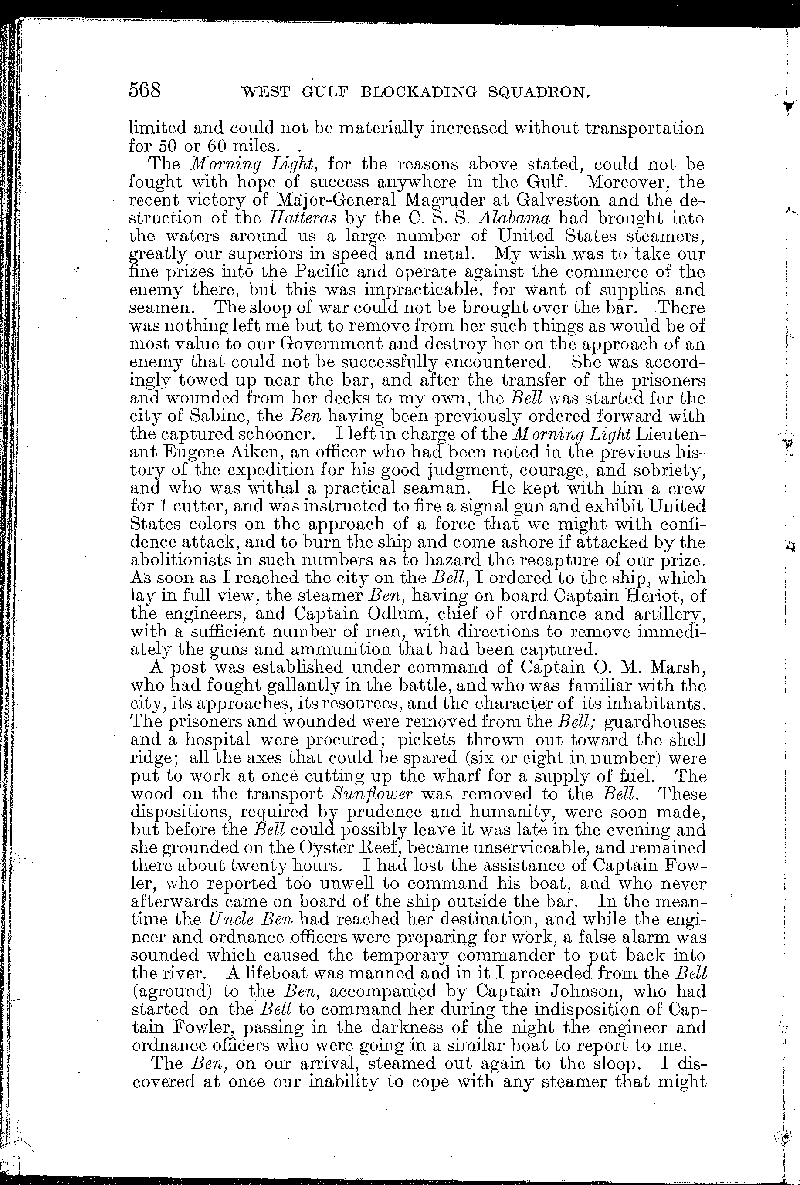
Supplemental report of (Confederate) Major Watkins to Captain E. P. Turner, Assistant Adjutant-General, regarding the capture of the USS Morning Light (Page 2 of 4). This is in Volume 19 of the Official Records of the Union and Confederate Navies in the War of the Rebellion.

(This report is continued from page 567, and is continued on pages 569 and 570)
Supplemental report of Major Watkins, C. S. Army, commanding on the Sabine River. (Page 2 of 4 pages)
(This report is continued from page 567) limited and could not be materially increased without transportation for 50 or 60 miles.
The Morning Light, for the reasons above stated, could not be fought with hope of success anywhere in the Gulf. Moreover, the recent victory of Major-General Magruder at Galveston and the destruction of the Hatteras by the C. S. S. Alabama had brought into the waters around us a large number of United States steamers, greatly our superiors in speed and metal. My wish was to take our fine prizes into the Pacific and operate against the commerce of the enemy there, but that was impracticable, for want of supplies and seamen. The sloop of war could not be brought over the bar. There was nothing left me but to remove from her such things as would be of most value to our Government and destroy her on the approach of an enemy that could not be successfully encountered. She was accordingly towed up near the bar, and after the transfer of the prisoners and wounded from her decks to my own, the Bell was started for the city of Sabine, the Ben having been previously ordered forward with the captured schooner. I left in charge of the Morning Light Lieutenant Eugene Aiken, an officer who had been noted in the previous history of the expedition for his good judgment, courage, and sobriety, and who was withal a practical seaman. He kept with him a crew for 1 cutter, and was instructed to fire a signal gun and exhibit United States colors on the approach of a force that we might with confidence attack, and to burn the ship and come ashore if attacked by teh abolitionists in such numbers as to hazard the recapture of our prize. As soon as I reached the city on the Bell, I ordered to the ship, which lay in full view, the steamer Ben, having on board Captain Heriot, of the engineers, and Captain Odlum, chief of ordnance and artillery, with a sufficient number of men, with directions to remove immediately the guns and ammunition that had been captured.
A post was established under command of Captain O. M. Marsh, who had fought gallantly in the battle, and who was familiar with the city, its approaches, its resources, and the character of its inhabitants. The prisoners and wounded were removed from the Bell; guardhouses and a hospital were procured; pickets thrown out toward the shell ridge; all the axes that could be spared (six or eight in number) were put to work at once cutting up the wharf for a supply of fuel. The wood on the transport Sunflower was removed to the Bell. These dispositions, required by prudence and humanity, were soon made, but before the Bell could possibly leave it was late in the evening and she gorunded on the Oyster Reef, became unserviceable, and remained there about tweny hours. I had lost the assistance of Captain Fowler, who reported too unwell to command his boat, and who never afterwards came on board of the ship outside the bar. In the meantime the Uncle Ben had reached her destination, and while the engineer and ordnance officers were preparing for work, a false alarm was sounded which caused the temporary commander to put back into the river. A lifeboat was manned and in it I proceeded from the Bell (aground) to the Ben, accompanied by Captain Johnson, who had started on the Bell to command her during the indisposition of Captain Fowler, passing in the darkness of the night the engineerr and ordnance officers who were going in a similar boat to report to me.
The Ben, on our arrival, steamed out again to the sloop. I discovered at once our inability to cope with any steamer that might (This report is continued on page 569)
This site is sponsored by the Friends of the Old Naval Hospital
Last updated November 9, 2008